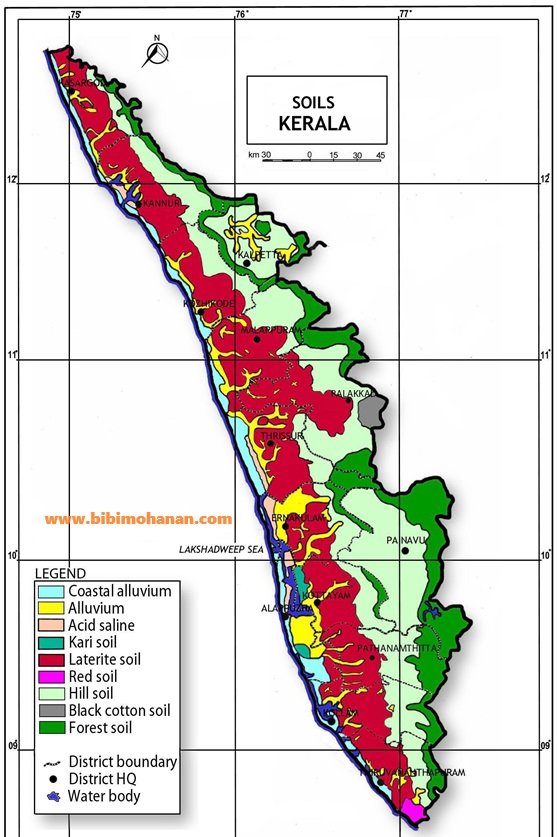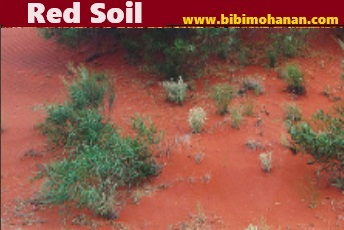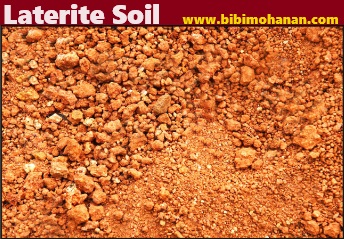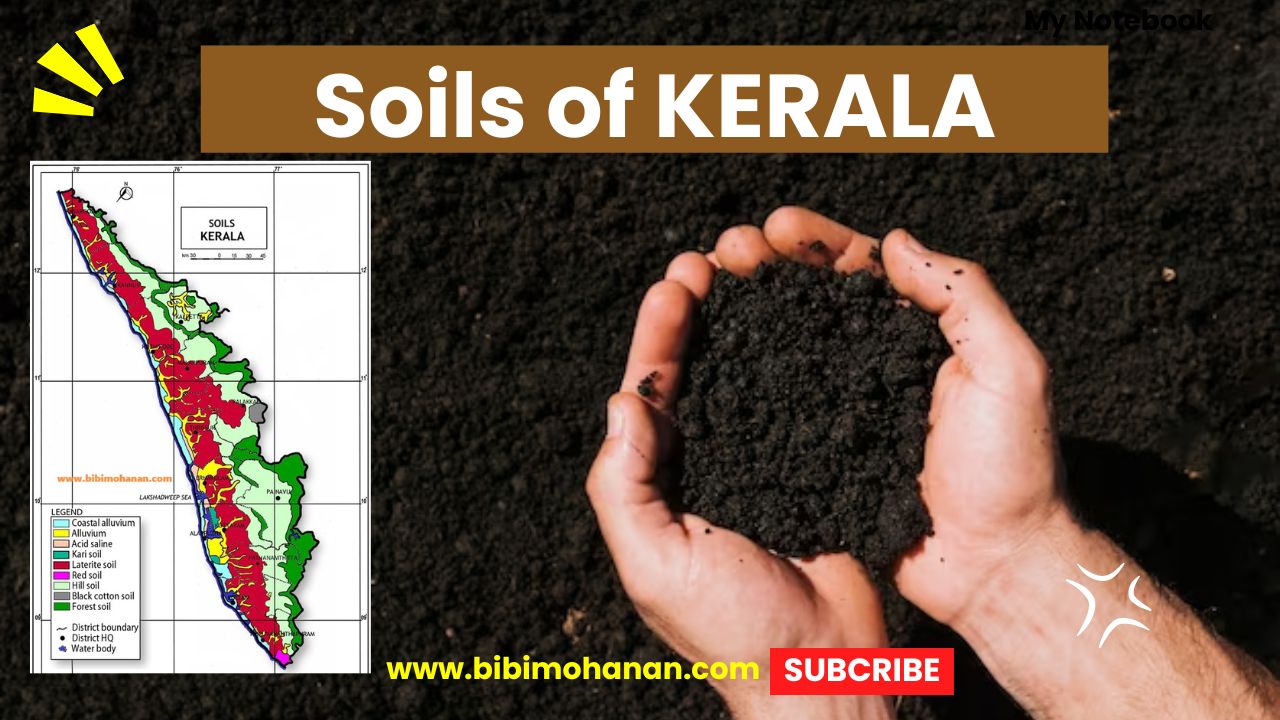Soils of Kerala are Red Soil, Laterite Soil, Coastal Alluvium, Forest Soils, and Black Soil.
Soils are formed by the weathering of rocks. The process of soil formation is called Pedogenesis. Various factors such as climate, amount of rainfall, topography, type of rock, nature of weathering, erosion etc determine the kind of soil formed.
Soils of Kerala
The main Soils of Kerala are;
- Red Soil
- Laterite Soil
- Coastal Alluvium
- Forest Soils
- Black Soil

Red Soil (Red Loam)

- Red soil is found in the southern parts of Thiruvananthapuram.
- The red colour of the soil is due to the presence of hematite or anhydrous fer- ric Oxides in the soil.
- This kind of soil easily absorbs water but are deficient in soluble minerals that are essential for the growth of plants.
- These soils are essentially kaolinitic in nature,acidic in reaction and friable.
Laterite Soil

- Laterite soil is the single largest type of soil found in Kerala, It covers 68% of to- tal area of the state.
- It is generally formed in the moist tropi- cal regions due to the weathering of granite and gneiss.
- They are also formed by the weathering of Sedimentary rocks.
- Laterite soil is formed in the regions were hot season and rainy season occur alternatively.
- Rubber, Pepper, Cashew etc. are culti- vated in this type of soil.
- Laterite soil is predominantly found in the northern parts of Kerala like Kozhikode, Kannur, Malappuram and Kasargod.
Coastal Alluvium
- This type of soil seen in the coastal tracts along the Arabian coast with an average width of 10 km.
- This type of soil are of marine origin. Recent marine deposits and sand is the chief constituent of this soil. It has low water retaining capacity and is not fer- tile.
- It has a very rapid permeability.
- These soils are acidic (pH < 6.5 in most areas)
- Paddy, Coconut, Plantains, Vegetables and tuber crops are cultivated in this soil.
- Sand and silt is the main constituent of coastal alluvium. find sand,
Forest soils
- Forest soils are formed by the weather- ing of igneous and metamorphic rocks.
- Forest soils are found mainly in Idukki, Wayanad, and Palakkad districts.
- Pepper, Rubber, Tea, Coffee, Carda- mom etc. are the main crops cultivated in this soil.
- These soils are the products of weath- ering of crystalline rocks under forest cover.
- This soil is quite fertile under forest cover.
- They have acidic acidic nature with pH ranging from 5.5 to 6.3.
Black Soil
- Black Soil is found in the Chittur taluk of Palakkad.
- It is the continuation of the black cotton soil of the adjoining Coimbatore district of Tamilnadu.
- These soils are low in organic matter ,calcareous, neutral to moderately alka- line (pH 7-8.5) and high in clay content.
- They exhibit cracking during dry periods.
- Cotton, groundnut, Sugarcane, etc… are the chief crops cultivated here.
Riverine alluvium
- Riverine soil is formed by the den- udation of rivers, the soil is highly fertile and bears high water retain- ing capacity.
- This soils are acidic in nature.
- The Soil is ideal for cultivation of paddy, coconut, arecanut, pepper, Plantains, Pulses and Vegetables.
Onattukara Alluvium
- Onattukara Alluvium is mainly found in the Onattukara region comprising of Karunagap- pally, Karthikappally, and Mavelikara taluk of Kollam and Alappuzha districts.
- The soil of Kuttanadu region is highly acidic and saline in nature.
- The soil of Kuttanad is classified into three main categories: Kayal, Karappadam and Kari soils.
- Kayal soils are found in and around the regions of Kayals (lakes).
- Kayal soil comprises of reclaimed areas of Kot- tayam and Alappuzha districts.
- Karappadam is distributed over the large area of upper Kuttanadu.
- They are periodically replenished by the silt des posit carried by the rivers during flood.
- Kari soils are found in Ambalappuzha, Cher- thala and Vaikkom taluks.
- The name Kari is derived from the intense black colour of the soil due to the presence of partial- ly decayed organic matter(peat) and pyrites in large quantity.
- Kari soil is highly acidic and saline.
- Addition of sufficient organic matter and irriga- tion facilities improve the water holding capac ity.
- Coconut, Paddy, and Tapioca etc are the major products that are derived from these soils.
Join Telegram Channel for Study Notes
- [PDF] Syllabus HST Hindi|134/2025 syllabus Kerala PSC
- [PDF]Syllabus HST Physical Science| 145,146/2025 syllabus Kerala PSC
- [PDF]Syllabus Deputy Finance Manager COIRFED|284/2024, 285/2024 syllabus Kerala PSC
- [PDF]HSA Social Science Syllabus Kerala PSC
- [PDF]Fireman Syllabus KERAFED|430/2024 syllabus Kerala PSC
